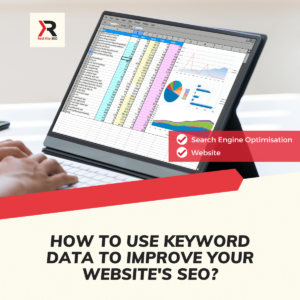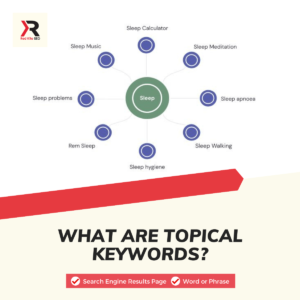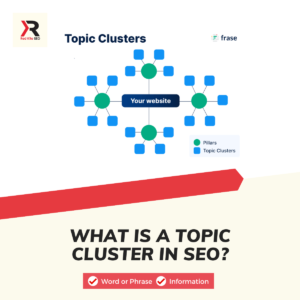Keyword Research How to Improve Your Website SEO
Keyword research is an important part of SEO (Search Engine Optimisation). It is the process of finding and using keywords that will help your website rank higher in search engine results pages (SERPs).
By doing keyword research, you can find out what your target audience is searching for online and then use that information to improve your website’s SEO.
In this blog post, we’re going to cover everything you need to know about keyword research, from how to do it, to how to use it to improve your website’s SEO.
We’ll also cover some related topics, such as search intent and using keywords in your writing.
By the end of this post, you should have a good understanding of keyword research and how it can benefit your website.
What Is Keyword Research and Why Is It Important?

Keyword research is the process of finding words and phrases related to your business that people search for on Google and other search engines.
By adding these keywords to your website, you can improve your chances of ranking higher in Google’s search results, which can lead to more enquiries and customers.
There are a number of different keyword research tools available, such as Google’s Keyword Planner, that can help you find relevant keywords for your business.
“Once you have found some relevant keywords, it is important to consider what intent (or purpose) someone might be searching for that particular keyword.”
For example, if someone searches for cheap TVs, they are probably looking to buy a TV; whereas if someone searches for how to fix a TV, they are probably looking to find instructions or advice.
You should also look at the competition for each keyword – how many other websites are trying to rank for that particular word or phrase?
If there are already a lot of websites competing for that keyword, it might be harder to rank high in Google’s search results.
Once you have chosen your target keywords, it is important to add them into your website content in a way that is both user-friendly and SEO friendly.
This means using the keywords naturally throughout your text, without stuffing them in unnaturally or making your content difficult to read.
How to Do Keyword Research for Your Website?

When it comes to SEO, one of the most important things you can do is research your keywords. Without a well-targeted set of keywords, your website will likely not rank as high in search engines. Here are some tips on how to do keyword research for your website:
1. The importance of keyword research
First and foremost, it’s essential that you conduct keyword research before starting any marketing or SEO efforts on your website. Without knowing what words people are searching for specifically, it’s difficult to design an optimised site that catches attention.
Keyword research also enables you to track which terms are bringing in the most traffic and potentially generating conversions.
2. How do I find a primary keyword?
The first step in finding keywords for your website is identifying a primary keyword or set of keywords that will be the focus of your site.
This can be tricky since there is no one definitive answer – different sites target different keywords depending on their niche and audience. However, there are several methods you can use to identify a primary key word:
- Brainstorming with clients
- Analysing competitor websites
- Conducting Google AdWords targeting analysis (more on this later)
- Simply ask yourself what people might type into the search engine when conducting a query about your industry or topic area.
3. How do I find the right keywords for my website?
Once you have identified a primary keyword or set of related keywords, it’s time to start looking into specific phrases and variations thereof that may be more relevant to your business and target audience.
When selecting these terms, make sure they’re both relevant and catchy – if someone types in “online marketing services San Francisco” but doesn’t see any results showing up on their search engine results page (SERP), they may quickly lose interest and move onto another site!
Finding specific term ideas, try using tools like Google Trends or SEMrush Keyword Explorer. Consider using long tail keywords (those which typically have 3-5 words instead of just 1) in your keyword research. Because they tend not to show up as frequently on search engine results pages (SERPs).
Once you have selected potential keyphrases/keyword variants/phrases, it’s time to begin researching them further by checking out major online databases like Wordtracker, Moz, SEMrush, etc.
What is the search volume?
The search volume is the number of search queries for a specific search term in a search engine such as Google within a specified timeframe.
This is referred to as the search volume, typically shown as the monthly search volume for that keyword. The number of search queries is estimated and subject to seasonal, geographical, and thematic changes.
What is a good search volume?
At Red Kite SEO, we’d say 100-1000 searches per month is a reasonable keyword search volume, as this would certainly deliver good levels of organic visitors. A ‘good’ keyword volume for a monthly search, is determined by a number of factors, including search intent, industry, seasonality, and competition, to name a few.
Here’s a video on the Keyword Research process using one research tool
What Are the Best Keyword Research Tools Available?

There are many great keyword research tools available that can help you improve your website’s SEO. Each tool has different features and benefits, so it is important to choose the right tool for your needs. Some of the best keyword research tools include:
- Google AdWords Keyword Planner
- Moz Keyword Explorer
- Semrush
- InLinks
- SpyFu
- Wordtracker
- Ahrefs
- Soovle
- Google Search Console
- SECockpit
- SERanking
- Serpstat
- Surfer SEO
- Google Trends
- Also Asked
It is important to note that keyword research tools are to help you gather data and collect keyword terms quickly, so you can choose profitable keywords to target.
Once you have chosen a keyword research tool, it is important to familiarise yourself with its features. Some of the most common features include search volume data, monthly searches data, Adwords keywords data, subreddit keywords data, and competitor analysis.
By using these features in conjunction with other factors such as your business goals and target market niche, you can increase your chances of achieving success with SEO optimisation efforts.
How to Use Keyword Data to Improve Your Website’s SEO?

Website SEO is one of the most important factors when it comes to attracting visitors to your site. In order to improve your website’s SEO, you will need to use keywords in your content and in your page titles. However, there are a few things that you should keep in mind when it comes to keyword selection.
The first thing that you need to consider is the type of keyword that you are targeting. There are two main types of keywords: long-tail and head keywords.
Long-tail keywords are more specific than head keywords (main or primary keywords), and they are better for improving rankings in search engines because they generate more traffic over time.
Second, you will want to make sure that your chosen keywords are relevant to your topic. This means that you should research which words and phrases people use when searching for information about your topic.
You can then use these terms as the basis for selecting relevant keywords for your website. It is important not to overuse any particular keyword or phrase on your website. Doing so will likely result in decreased traffic and lower rankings in search engines.
What Is Search Intent and How Can You Optimise for It?

Search intent is the goal of a search engine user, and it can be defined differently by various search engines. Generally speaking, search intent is the desire of a user to find specific information or items on the internet.
This can include things like finding products or services, obtaining information about a particular topic, or getting an answer to their problem.
Search intent has many factors. These factors include the keywords being used in the query, how relevant those keywords are to the user’s needs, and how well those keywords are positioned on your website.
It’s important to understand these factors so that you can optimise your website for search intent and maximise your chances of ranking for those targeted keywords.
What type of searches are there?

One way to improve SEO results is to optimise your website for different types of searchers.
Google breaks search queries into three categories:
- Navigational search queries
- Transactional search queries
- Informational search queries
By understanding which type of searcher you’re targeting, you can take steps to improve your website specifically for them.
Data Tools like Google AdWords Keyword Planner can help you research which keywords should be targeted based on your business goals and objectives. Additionally, using keyword research tools like SEMrush will give you more detailed insights into what words and phrases people might use when searching for related topics.
Armed with this knowledge, it will be much easier to create high-quality content that targets relevant searchers and improves overall site traffic.
How to Find Out What Your Target Audience Is Searching for Online?

When trying to find out what your target audience is searching for online, there are a variety of tools that can be used. One such tool is keyword research tools.
This type of tool allows you to analyse the keywords and phrases that are being used most often on various websites. By understanding your target audience’s interests and needs, you can create content that is more relevant and targeted.
Businesses also need to be aware of the different things website owners should be looking for when trying to improve their website search engine optimisation (SEO).
For example, it is important to make sure all URLs are correct and include the correct title tags, meta descriptions, etc.
Additionally, it is necessary to ensure that all images are properly (alt) tagged and optimised for SEO purposes. Proper SEO will help your website rank higher in search engines and attract potential customers.
There are many benefits associated with improving your website SEO – including increased traffic and conversion rates, increased brand awareness, and increased revenue streams.
So, if you’re looking to increase your website’s visibility online, incorporating some quality SEO techniques into your marketing strategy may be the best way to go about it.
What Is an SEO Entity?

An SEO entity is a business or website that appears in search engine results pages (SERPs) for certain queries. By appearing as an SEO entity, businesses and websites can improve their site’s ranking in SERPs, get more enquiries and organic traffic, and better understand their target audience’s needs.
In order to appear as an SEO entity, businesses and websites need to optimise their site for specific topic entities rather than focus on just keywords that their target audience is searching for.
If you check at Wikipedia, you can find a page for your main service or product. It is important to note here that even entities have classes, or entity types Examples can be one of the following:
- Person
- Location
- Organisation
- Event
- Thing (pretty much everything else!)
So the next SEO written article you create, make sure to do a little entity research for your topic.
Entity-based SEO is all about focusing on entities rather than keywords.
Keywords still have their place, but in general, an entity (or named entity) is a single, well-defined thing or notion that may be linked to a knowledge graph.
In the SEO industry, an entity is any subject that may be linked to search engine knowledge graphs, such as the Google Knowledge Graph.
We know that Wikipedia served as the Knowledge Graph’s primary trustworthy seed set. For the sake of convenience, we can refer to an Entity as any subject that can be associated to a Wikipedia article page.
Google Loves Entities and You Should too

This means that your business and website needs to meet what people are looking for on the internet, and make sure that you have content that addresses these topics and entities associated with the subject.
Once you’ve updated your site with the relevant information, it’s important to monitor your rankings regularly so you can keep up with changes in Google’s algorithm.
If you’re not ranking well on search engine results pages (SERPs), there are a few things you can do to improve your situation.
You can update your website content regularly with new or revised information, add more targeted keywords to your website titles and descriptions, create social media accounts specifically devoted to promoting your site, or hire an SEO company like Red Kite SEO who will help you optimise your site for better rankings.
Watch Dixon Jones explain more on associating Entities and Topics to your web pages.
How Do You Use Keywords in Writing?

When you’re writing for the web, it’s important to use keywords. Keyword research tools can help you identify which keywords are most relevant to your website and your target audience.
Once you have identified your target keywords, it’s important to include them throughout your website content.
Google has a lot of discretion when ranking websites in its search results. This means that if you don’t optimise your website for keyword placement, you might not see the benefits that you expected.
Additionally, organic search is important – especially for smaller businesses – as it can be more difficult to get noticed on Google than through paid advertising.
Tips for using keywords in your writing

1. Be consistent – Use the same keyword throughout your website and web page content. This will make it easier for Google to index your content and rank you higher in relevant, organic search results.
2. Plan ahead – Identify which keywords are most relevant to your website and target audience, and include them throughout your website content. Using a topic cluster, Silo or bucket of Keyword and entity focused content will help keep your website theme on point and relevant.
3. Optimise your content – Before you publish any new content, take some time to test your written content for web pages. Using tools like Frase, Surfer, and Inlinks will help direct your efforts for the maximum SEO efforts.
Just because you think you have written the best award-winning article, doesn’t mean Google will think it is fantastic and rank you number one in the search results for that topic. Testing against currently ranking competitors is vital.
Where Should I Use Keywords on My Website?

One of the most important things to remember when it comes to SEO is that you need to use keywords throughout your website.
In fact, it’s highly recommended that you place keywords in the page title, meta description, headings (H1, H2, etc.), and in the body text.
Additionally, make sure to include keywords in alt tags for images. By doing this, you can help improve the visibility of your website and increase traffic.
There are a few different ways to approach keyword placement on your website. One option is to use the Google Adwords Keyword Planner. This tool can help you identify which keywords are most relevant to your business and target them with paid ads.
Another option is to use a content analysis tool like Google Search Console or SEMrush, which will provide you with information about the keywords people are typing into search engines when they visit your site.
Once you have a good understanding of the key words people are searching for, it’s important to incorporate those terms into your site’s written content.
Watch a video overview on placing keywords on your website
Writing Articles and Blog Posts on Your Website
One of the best ways to add more keywords is by including blog posts and articles that focus on those keywords. You can also include keyword-rich titles and descriptions for images and videos, as well as directory listings and product pages.
By doing this, you’ll ensure that all of your website’s content is optimised for SEO purposes.
How Should I Organise My Keywords?

One of the most important things you can do for your SEO is to target the right keywords for your business. However, this can be a difficult process, and there are a number of factors you need to take into account.
In this section, we’ll outline how to target the right keywords for your business, and explain the importance of understanding keyword intent.
We’ll also discuss some keyword research tools that can help you find the right keywords for your website. Finally, we’ll show you how to organise your keywords in order to achieve maximum impact on search engines.
There are a few key things you need to keep in mind when it comes to keyword research.
First, you need to be sure that the keywords you choose are relevant to your business.
Second, you need to ensure that the keywords are appropriate for your website and content. Finally, you need to find keywords that will be effective for your target audience.
What are Topical Keywords?

One of the best ways to achieve this is through topical keyword research. By focusing on specific topics, you can narrow down search parameters and improve your chances of ranking high in search engines. However, this type of research can be difficult without the right tools.
Fortunately, there are a number of online tools and resources that can help you with topical keyword research. For example:
- Google Keyword Planner
- Ahrefs’ Content Explorer
- Surfer SEO
Offer comprehensive data on all aspects of SEO including competition analysis and keyword discovery rates.
You want to place your list of keywords in order, from top to bottom.
Take into account factors such as:
- Search volume
- Paid keywords
- Competing number of web pages
All needs to be taken into account. You then place your keywords as:
- Primary keyword (top level)
- Category
- Supporting articles (blog posts)
Tracking Your Keyword Rankings.
Tracking data allows you to understand which keywords are generating leads or sales for your business, as well as identifying any areas where improvements could be made.
Finally, it’s important to make sure that your keywords are properly organised on your website so they receive maximum exposure from search engines.
This involves ensuring that each page includes at least one “natural” keyword – a word or phrase that appears organically within the content – and building an effective title tag strategy around these words.
Title tags play an important role in determining how easily a particular piece of content jumps out from among others when users do a search engine query based on those words or phrases.
Who Are Your Competition, and What Keywords Do They Rank For?

SEO is a process of optimising a website so that it can rank higher in search engine results pages (SERPs). This means that your website will appear before websites that are not optimised for SEO.
There are many factors that go into ranking higher on search engine results pages, but one of the most important is keyword selection. It’s important to understand what keywords your competitors are targeting and how you can improve your website SEO to get more enquiries and higher google rankings.
To get a better understanding of what keywords your competition is targeting, you can use a Keyword Tool. The keyword research tool will show you how many people are currently advertising with those keywords and how much money they’re spending on AdWords each day.
You can then use this information to improve your website SEO so that you can rank higher in search engine results pages.
Another way to get an idea of what keywords your competitors are targeting is to research their website. Look at their domain name, target keyword(s), page title and meta description, as well as any external links pointing to their site.
By doing this, you’ll be able to build a comprehensive list of organic and paid keywords that are important to your competition and target them in your website SEO strategy.
For more details on how to find your competitors keywords, read my step by step guide here.
Should I Use Similar and Related Keywords on My Web Pages for Better SEO Results?

What are synonyms and related keywords?
Similar-sounding words are synonyms.
Keyword synonyms are words that mean the same as a given keyword. If your webshop sells women’s outfits, keyword synonyms include ladies’ apparel and ladies’ garments.
LSI keywords (Latent Semantic Indexing) are connected to your keywords. Women’s outfits keywords include pencil skirts, stilettos, and outfit ideas.
Why should my website use synonyms?
Related keywords and synonyms help users find a website, and Google favours well-written, interesting content. Using long-tail keywords will attract specialist consumers.
Synonyms make your content more entertaining to read, and high-quality content is more likely to be shared. This will impress Google’s crawl bots.
Can search engines recognise related keywords and synonyms?
Although repeating your primary keyword is still vital, Google recognises related keywords and synonyms in your website content. How? Since Google’s related entities patent, keywords no longer need to be exact matches to affect SERPs. Google can now quickly link ideas.
There are a few things you need to keep in mind when conducting keyword research. Firstly, it’s important to target keywords that people actually use on the web. This means avoiding words and phrases that are only used by experts or in specific industries.
You should focus your efforts on relevant keywords. This means choosing keywords that are associated with your website content and business sector.
It’s important to track your website’s SEO results over time so you can see how your targeted keywords are affecting traffic and search engine rankings.
By following these tips, you can improve your website’s SEO results quickly and easily.
What Is a Topic Cluster in SEO?

In SEO, topic clusters are a way to organise your keywords in a way that makes it easier for search engines to find and rank your content. Topic clusters are made up of keywords that are related to each other. For example, you might group “informational” terms like :
- Where do coffee beans come from
- Coffee beans plant
- Where are coffee beans grown
- What is in coffee beans
- How is coffee beans made
- Coffee beans come from
A shopping terms example is clustered:
- Costa espresso pods
- Iceland coffee pods
- Nespresso pods colombian
- Colombian coffee pods
To create a topic cluster, you first need to identify the topics that are important to your business. After you have identified these topics, you then need to look for keywords that are related to each of these topics.
Once you have identified these related keywords, you can then group them together into a topic cluster like above.
After you have created your topic cluster, you can use it in order to improve the ranking of your content on search engines. By clustering your keywords around relevant topics, you will make it easier for Google and other search engines to find and rank your content.
Topic clusters can be a great way to organise your keywords in order to make it easier for search engines to find and rank your content.
By clustering related keywords around relevant topics, you will make it easier for Google and other search engines to understand and rank your content. This will help you attract more visitors from the search engine results pages (SERPs).
Keyword Research for PPC (Paid Adverts)

Keywords are classified into the following categories:
Brand terms – are any keywords that include your brand name or trademarked terms.
Generic terms are terms that refer to products (e-commerce keywords) or services offered.
Related terms – terms that aren’t directly related to what you’re selling but that users interested in your products or services may look up.
Competitor terms – are the brand names of your competitors’ products and services that are similar to yours.
Put yourself in the shoes of your customers. What phrases and questions would they have to write (or say) into the search box to find your website?
Begin with broad keywords and work your way down to specifics. (exact match keywords)
As an example:
Shirts -> women’s shirts -> long-sleeve shirts -> black long-sleeve shirts
How do I find voice related keywords?

In response to the increased number of voice-led search queries from people voicing questions into their mobile phones, to search for goods on the move, search engines are becoming more capable of understanding longer strings of words.
Take this into consideration and include not only search terms that may come from a keyboard, but also terms that reflect how people actually speak – they are not the same thing.
A more typical search query may be “Thai restaurants New York,”
However someone searching on their phone might say “what’s the greatest Thai restaurant in New York?”
Or “Where in New York can I obtain Thai food?” Don’t be scared to use variations like “How can I…?” “How are you…?” “nearest me” and “What is…?”
How do I find the best keywords for PPC?

Keyword tools assist you in narrowing down the terms that people are typing into search engines.
There are plenty of tools available to help you determine the popularity of specific keywords, ranging from Google’s Keyword Planner (included with Google Ads, formerly known as AdWords) to WordStream’s free Keyword Suggestion Tool.
Each keyword tool is a little different, but the most important figure to check for is search volume. The higher the search volume, the more people search for that particular term each month.
Free keyword research tools for PPC:

1. Keyword Planner
Google’s Keyword Planner is the most used PPC keyword tool. Advertisers can use this tool to search for new keywords and ad group ideas. Google’s tool assesses search volume and CPC for each keyword. The Keyword Planner is helpful for keyword brainstorming but shouldn’t be the only tool used.
2. Autocomplete Google
Autocomplete google picture
Start typing a word or phrase in the Google search box to see similar recommendations. Autocomplete is based on how often users have searched for a phrase. It’s helpful for finding long-tail keywords from a head keyword or phrase.
3. Übersuggest
Übersuggest is a keyword tool. This tool uses Google and other search engines’ suggest data to extract keyword suggestions by adding a letter or number to your head term.
4. Keyword tool
The Keyword Tool is similar to Übersuggest because it uses Google Autocomplete, but it generates up to 750 suggestions per keyword. I recommend this simple and fast long-tail tool.
5. WordStream Free Keyword Tool
WordStream’s Free Keyword Suggestion tool has limited functionality but can generate relevant and profitable keywords for your topic. The tool delivers more diverse long-tail keyphrases than Keyword Planner and more tightly connected suggestions.
6. Keyword Eye (Basic)
Keyword Eye is a visual keyword research tool that offers a “keyword cloud” of suggestions based on search volume and competitiveness. You can also order suggestions by metric in a grid view. Free users get 20 keyword searches each day, 100 keywords every report, and 25 Google national keyword databases.
7. Keyword Revealer’s Keyword Tool
Keyword Revealer’s free keyword tool provides keyword suggestions and metrics like Search Volume, CPC, and Estimated Profit. Similar to Keyword Eye, it predicts which keywords will be profitable based on competition.
Non-paying users are limited to 3 searches per day, so be selective.
8. Search Terms AdWords
The best keywords can come from the search terms visitors used before clicking on your ad. See how people search for your products or services to get inside their heads. When using the Google AdWords search terms report, add high-performing terms as keywords. If a non-relevant query triggers your ad, use a negative keyword.
How User Personas Can Improve Your SEO Strategy

User personas are a valuable tool when it comes to SEO strategy. They help you understand your target audience and how they search for information.
This knowledge can then be used to improve your website’s content and design, as well as your online marketing efforts.
What is a search persona? A search persona is an idealised version of a user that represents the majority of your target audience.
It helps you to better understand how users interact with your website and what keywords they are likely to use when searching for information.
How do you identify target personas?
There is no single answer to this question, as it will depend on the specifics of your business and customer base.
However, generally speaking, you should identify four or five key personas that represent the different types of users that visit your website. You should then aim to align each persona’s keywords accordingly.
Are you Aligning Keywords to Your Personas?
It is important not only to identify which keywords match each persona’s interests, but also to use those keywords in Appropriate Places on Your Website.
This means placing them near the relevant content items, rather than burying them deep within lengthy paragraphs or in obscure locations on the site.
Doing so will ensure that potential customers find what they are looking for quickly and easily – two essential factors when trying to convert leads into customers!
Your Keyword Research is Important.

Keyword research is essential and the first step for any website that wants to rank higher in search engine results pages.
By doing keyword research and using relevant keywords in your content, you can improve your website’s SEO and attract more visitors.
There are a number of great keyword research tools available, paid and free, each with different features and benefits.
Choose the right tool to help you fulfil your needs and familiarise yourself with its features to make the most of it.

Pete Hogg is an accomplished SEO consultant with a proven track record of driving organic traffic and boosting online visibility. With 8 years of experience in the ever-evolving world of digital marketing, he has helped businesses achieve top rankings on search engines. A passionate advocate for SEO best practises, Pete Hogg combines technical expertise with a deep understanding of content strategy to deliver results that matter. When not optimising websites, he enjoys wheelchair rugby. Connect with Pete Hogg to take your online presence to the next level.

